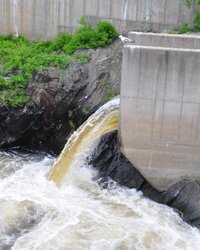The link is not to an article, but to the home page of a Merrimack River group.
Which you saw how frequently, prior to the June 29th "dismantling" of a rule that wasn't even in effect yet?
Let's be clear what the topic here actually is, because it hasn't been clearly presented, resulting in comments like this that are way off base:
Georgepds first indicated this is about combined (stormwater and sanitary) sewers, but then referred to MS4, which from a quick search is "Municipal separate storm sewer systems." Combined sewer overflows (CSO) and treatment plants are already under federal water quality mandates and have been since at least 1972, with significant new requirements implementing long term changes required by the Clean Water Act being finalized 15-20 years ago, if I'm remembering the time frame right.
I knew something was way off target with the "turds in the rivers" snark, because this was a contentious topic in Portland over a decade ago, around the time I started paying my own sewer bill, when rates were skyrocketing due to a massive local CSO reduction project that was just getting under way. The challenge of fixing old, poorly designed sanitary sewer systems and reality that it was taking place is something I was very financially aware of, and Portland was just one of the many cities tackling it.
Digging up the court filing confirms the federal action in question actually is about stormwater, not sewage, and specifically about stormwater from small cities. Medium and large cities are already subject to separate permits.
They didn't "halt the whole program," as claimed but delayed the implementation date by 1 year because a couple of the cities affected by it asked for time to review some legal challenges to certain provisions that were still in court at the time. Otherwise it could have forced the cities that requested the delay to spend money on provisions that might have been removed by those cases. This sort of stay is common in such cases. However, the Rivers Alliance argues the EPA did not properly demonstrate four criteria for issuing a stay were fulfilled, so it may have been an inappropriate stay. Amusingly (to me at least), that last sentence is a pretty comprehensive summary of the entire 32 page filing, which is mostly helpful background info and standard legal details.
The rule is not even new. Rather, it is an update and replacement of the previous stormwater permit from 2003, which itself was the outcome of 30 years of progress on water quality standards following the Clean Water Act. Per the Massachusetts River Alliance's own court filing, the reason this is even being handled by the current administration's EPA is because the prior administration's EPA was 8 years late finalizing the terms of the new permit, meaning the old permit has remained in effect long after its original 5-year expiration.
Looking the new permit up, it's quite extensive - almost 300 pages of conditions, standards, and enforcement requirements ranging from treatments standards for rainwater running off of new parking lots to clarifying that firefighters don't need special permission to use water to fight fires (I wish I were joking, but apparently they really considered that).
Nothing that I'm seeing indicates the 200+ small cities who did not join in the request for a delay are in any way prevented from implementing the permit conditions per the original schedule, only that they are not required to. So in the overwhelming majority of cases, the proximate reason for delayed implementation is because those cities choose to take advantage of the EPA allowing them to wait.
The Rivers Alliance filing also says the state of Massachusetts itself could have done the same and likewise chose not to. Keep in mind, we're not talking about Trump country here - less than 1/3 of voters in Massachusetts voted for him. There's quite a few more people involved in this delay besides Pruitt. I'd hazard a guess that very few of those at the state level have a similar environmental ideology to Pruitt, yet they hardly seem concerned about a 1 year delay, either.
Since I took the time to look these up to figure out the above...
EPA Postponement Order:
https://www3.epa.gov/region1/npdes/stormwater/ma/final-ms4-postponement-notice.pdf
Mass. Rivers Alliance Motion for Relief:
http://law.lclark.edu/live/files/24685-filed-complaintpdf
The Massachusetts small cities permit itself:
https://www.epa.gov/npdes-permits/massachusetts-small-ms4-general-permit




